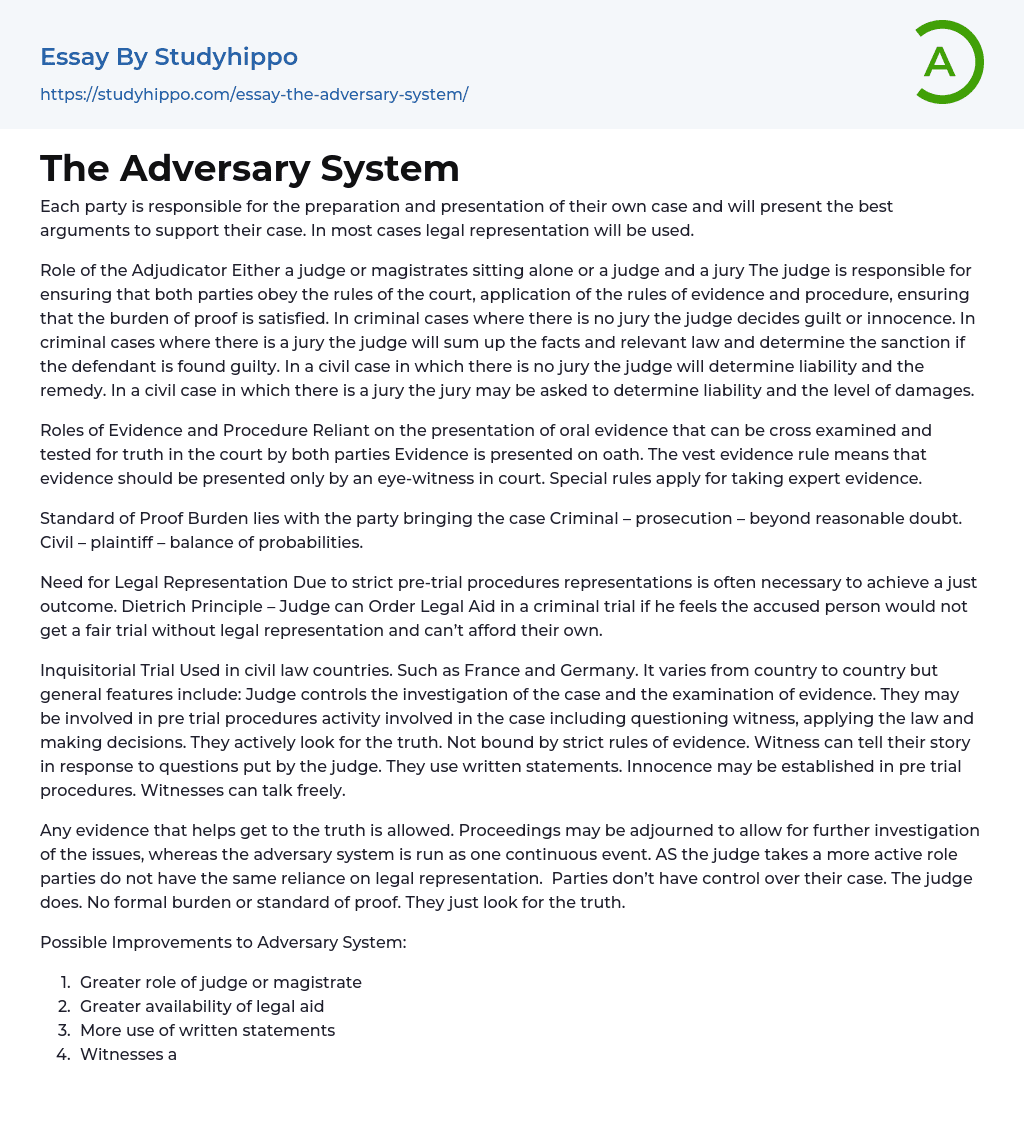Both parties are responsible for preparing and presenting their own case, utilizing compelling arguments to uphold their positions. Legal representation is typically employed in most cases.
The adjudicator's role is to enforce court rules, evidence and procedure for both parties involved. They also ensure that the burden of proof is met. In criminal cases without a jury, the judge determines guilt or innocence. However, in criminal cases with a jury, the judge summarizes facts and laws before deciding on punishment if the defendant is found guilty. In civil cases without a jury, it is up to the judge to determine liability and select an appropriate remedy. Conversely, in civil cases with a jury, they may consult jurors for input on liability and damages.
The court relies on the presentation of oral evidence, which can be cross-examined and tested for trut
...h by both parties. This evidence is presented under oath and follows the best evidence rule, governing the roles of evidence and procedure. According to this rule, only an eyewitness should present evidence in court. Expert evidence also has specific rules for its presentation.
In criminal cases, the prosecution has the responsibility of proving the case beyond a reasonable doubt. Conversely, in civil cases, it is the plaintiff's duty to prove their case based on the balance of probabilities.
In order to ensure fair outcomes in criminal trials, legal representation is essential due to the rigorous pre-trial procedures. According to the Dietrich Principle, judges are empowered to provide legal aid when defendants are unable to afford their own representation and would be deprived of a fair trial without it.
The inquisitoria
trial, prevalent in civil law nations like France and Germany, exhibits varying characteristics depending on the country. Nonetheless, it generally entrusts the judge with control over investigations and examination of evidence. The judge also assumes responsibilities in pre-trial procedures such as witness questioning, application of the law, and decision-making. In this type of trial, the primary focus lies in actively seeking the truth rather than strictly adhering to evidentiary rules. Witnesses can present their testimonies based on the judge's inquiries and often rely on written statements. Moreover, innocence may potentially be established prior to the trial commencement, enabling witnesses to express themselves without constraint.
Any evidence that assists in revealing the truth is allowed. The proceedings can be delayed to allow for further examination of the matters in question, while the adversary system remains ongoing. When the judge takes on a more active role, there is less dependence on legal representation by the parties involved. Instead, it is the judge who holds authority over their case. There is no specific burden or standard of proof; rather, the main focus is on uncovering the truth.
The potential enhancements for the adversary system are as follows:
- Greater role of judge or magistrate
- Greater availability of legal aid
- More use of written statements
- Witnesses able to tell their own story
- Reduce delay
- Judges to ensure out of court settlements are fair
The Adversary System, utilized in common law court systems, entails two opposing parties engaging
in a verbal conflict to determine the truth. Throughout this process, an impartial body supervises the proceedings.
- Business Law essays
- Contract essays
- Consumer Protection essays
- Property essays
- Ownership essays
- Agreement essays
- Common Law essays
- Contract Law essays
- Justice essays
- Security essays
- Tort Law essays
- United States Constitution essays
- Crime essays
- Lawsuit essays
- Treaty essays
- Family Law essays
- Marijuana Legalization essays
- Constitution essays
- War on Drugs essays
- Court essays
- Jury essays
- Police essays
- Protection essays
- Community Policing essays
- Criminal Law essays
- Judge essays
- Lawyer essays
- Employment Law essays
- Copyright Infringement essays
- Injustice essays
- Intellectual Property essays
- Breach Of Contract essays
- Jurisprudence essays
- Social Injustice essays
- Juvenile Justice essays
- Internet Privacy essays
- Cyber Security essays
- Bill Of Rights essays
- Civil Liberties essays
- First Amendment To The United States Constitution essays
- Fourth Amendment To The United States Constitution essays
- Second amendment essays
- Animal Cruelty essays
- Law Enforcement essays
- Juvenile Justice System essays
- Surveillance essays
- Forensic Science essays
- Crime Prevention essays
- Criminal Justice essays
- Criminology essays




